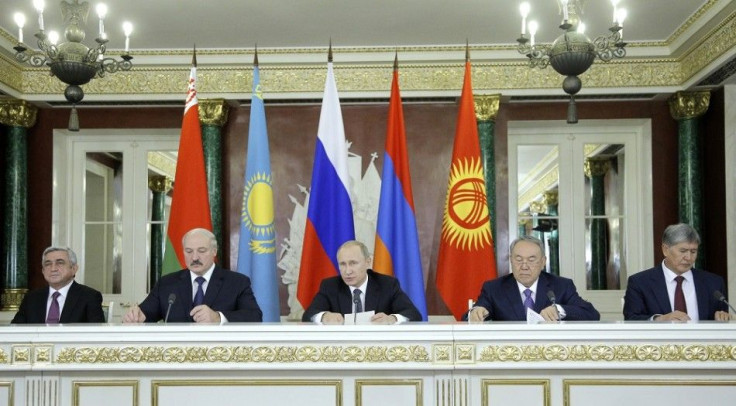Russia Spearheads Eurasian Economic Union With 4 Ex-USSR Nations To Counter Western Sanctions

At the start of 2015, there would be a new kid on the economic bloc as the newly former Eurasian Economic Union (EEU) officially starts to function. The EEU is Russian President Vladimir Putin's response to the western sanctions which has caused the rouble to depreciate by 50 percent since January.
It is made up of Russia and four former members of the defunct Union of Soviet Socialist Republic. These are Belarus, Kazakhstan, Armenia and Kyrgyzstan.
Mr Putin announced in a press conference on Tuesday the decision by Armenia and Kyrgyzstan to join the bloc.
YouTubw/RuptlyTV
Since ban on trade is the main tool of the western sanctions, the EEU would promote free trade among its member-nations. The bloc also aims to coordinate their financial systems and regulate industrial and agricultural policies.
Mr Putin said, quoted by the Miami Herald, "The Eurasian integration is based on mutual benefit and taking into account mutual interests." He boasted of a combined $4.5 trillion output of the new bloc which would affect the lives of 170 million people.
The EEU was supposed to be made of six nations, but with the ouster of the pro-Russian Ukraine president in February and Moscow's annexation of Ukraine's Black Sea Crimean Peninsula, Ukraine opted not to be a part of the new bloc.
However, even before the EEU official functions, there is at least one dissonant voice already when Belarusian President Alexander Lukashenko spoke against Russia's move to restrict its exports. Belarusia profits from the sanction by increasing its food purchases from the EU countries and reselling it to Russia with a margin.
To get even, Russia banned imports of Belarusian milk and meat due to alleged sanitary issues and forbade the transit of food imports to Kazakhstan on Russian territory because it could end in Russia instead.
Lukashenko complained that Russia's action is a breach of international rules and was done unilaterally with no consultations with him.
Meanwhile, Ukraine's foreign reserves dipped to its lowest level in 10 years due to the slowdown in the country's economy and weaker currency, the hryvnia, as the separatist campaign in the east continues. Its bullion holdings also decreased by 45 percent from a high of 42.9 tonnes in April, according to IMF data cited by Bloomberg.
To contact the writer, email: v.hernandez@ibtimes.com.au





















